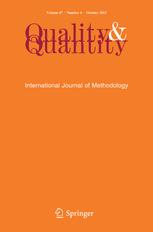Description
Authored by DPDF 2010 Discrimination Studies co-director, Samuel R. Lucas.
The multilevel model has become a staple of social research. I textually and formally explicate sample design features that, I contend, are required for unbiased estimation of macro-level multilevel model parameters and the use of tools for statistical inference, such as standard errors. After detailing the limited and conflicting guidance on sample design in the multilevel model didactic literature, illustrative nationally-representative datasets and published examples that violate the posited requirements are identified. Because the didactic literature is either silent on sample design requirements or in disagreement with the constraints posited here, two Monte Carlo simulations are conducted to clarify the issues. The results indicate that bias follows use of samples that fail to satisfy the requirements outlined; notably, the bias is poorly-behaved, such that estimates provide neither upper nor lower bounds for the population parameter. Further, hypothesis tests are unjustified. Thus, published multilevel model analyses using many workhorse datasets, including NELS, AdHealth, NLSY, GSS, PSID, and SIPP, often unwittingly convey substantive results and theoretical conclusions that lack foundation. Future research using the multilevel model should be limited to cases that satisfy the sample requirements described.

